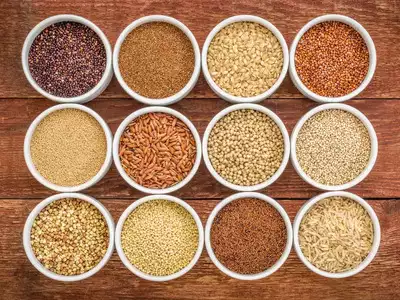
Introduction
Cereals and legumes are essential components of a balanced diet. They provide vital nutrients, including proteins, fiber, vitamins, and minerals, supporting overall health and well-being.
Health Benefits of Various Cereals
- Wheat
- Fiber: Aids in digestion and helps maintain healthy blood sugar levels.
- B Vitamins: Supports energy metabolism and brain function.
- Minerals: Rich in iron, magnesium, and selenium.
- Rice
- Carbohydrates: Provides a quick source of energy.
- Vitamins: Contains B vitamins, including niacin and thiamine.
- Low in Fat: Supports heart health.
- Barley
- Fiber: Promotes digestive health and reduces cholesterol levels.
- Antioxidants: Protect cells from damage.
- Minerals: High in selenium, magnesium, and phosphorus.
- Corn
- Antioxidants: Rich in carotenoids like lutein and zeaxanthin, which support eye health.
- Fiber: Aids in digestion and promotes satiety.
- Vitamins and Minerals: Contains vitamin C, magnesium, and potassium.
- Oats
- Beta-Glucan: A type of soluble fiber that reduces cholesterol and improves heart health.
- Protein: Supports muscle growth and repair.
- Antioxidants: Contains avenanthramides, which have anti-inflammatory properties
Health Benefits of Various Legumes
- Lentils
- Protein: Excellent source of plant-based protein.
- Fiber: Promotes digestive health and helps control blood sugar levels.
- Folate: Supports brain health and red blood cell formation.
- Chickpeas
- Protein and Fiber: Support weight management and digestive health.
- Vitamins: Rich in folate and iron.
- Low Glycemic Index: Helps regulate blood sugar levels.
- Black Beans
- Protein: Supports muscle health.
- Fiber: Promotes digestive health.
- Antioxidants: Protect against oxidative stress.
- Kidney Beans
- Protein and Fiber: Aid in weight management and digestive health.
- Vitamins and Minerals: High in folate, iron, and potassium.
- Antioxidants: Support overall health.
- Peas
- Protein: Supports muscle growth and repair.
- Fiber: Promotes satiety and digestive health.
- Vitamins and Minerals: Rich in vitamin K, vitamin C, and manganese.
General Health Benefits
- Heart Health
- The fiber in cereals and legumes helps reduce cholesterol levels and lower the risk of heart disease.
- Antioxidants protect against inflammation and oxidative stress.
- Digestive Health
- High fiber content promotes regular bowel movements and supports a healthy gut microbiome.
- Weight Management
- The protein and fiber in cereals and legumes promote a feeling of fullness, helping control appetite and reduce overall calorie intake.
- Blood Sugar Regulation
- The low glycemic index of many cereals and legumes helps maintain stable blood sugar levels, reducing the risk of type 2 diabetes.
- Nutrient Density
- Cereals and legumes are rich in essential vitamins and minerals, supporting overall health and preventing nutrient deficiencies.
Conclusion
Cereals and legumes are nutritional powerhouses that provide essential nutrients and offer numerous health benefits. Including a variety of these foods in your diet can support heart health, aid digestion, manage weight, and regulate blood sugar levels, contributing to overall well-being.
